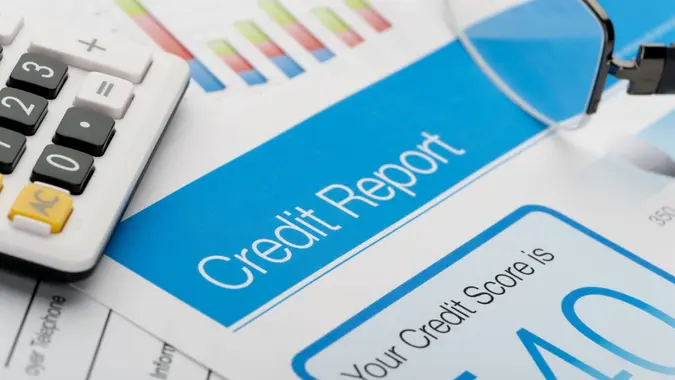How Divorce Can Impact Your Credit Score and How to Protect It

Commitment to Our Readers
GOBankingRates' editorial team is committed to bringing you unbiased reviews and information. We use data-driven methodologies to evaluate financial products and services - our reviews and ratings are not influenced by advertisers. You can read more about our editorial guidelines and our products and services review methodology.

20 Years
Helping You Live Richer

Reviewed
by Experts

Trusted by
Millions of Readers
Divorce can be an emotional rollercoaster–and while you’re sorting out personal matters, it’s easy to overlook how this life change can affect your finances. One common worry is credit. Will your credit score automatically take a hit just because you’re getting divorced? The short answer: no, but the financial shifts and decisions you make during and after a divorce can impact your credit if you’re not careful.
Let’s explore how divorce can affect your credit and, more importantly, how to protect yourself during this transition.
Does Divorce Directly Affect Your Credit Score?
Divorce itself doesn’t show up on your credit report, and credit scoring models don’t factor marital status into your score. In other words, there’s no checkbox for “divorced” that causes your number to drop.
But while divorce doesn’t directly lower your credit score, the financial responsibilities tied to your marriage–shared debts, joint accounts, and even court-ordered payments–can cause problems if they’re not handled properly. When payments are missed, debts go unpaid, or accounts are mismanaged, your credit score may be at risk.
How Divorce Can Hurt Your Credit
These financial responsibilities can sometimes be overlooked after a divorce, potentially harming your credit.
Missed Payments on Joint Accounts
When you and your ex share a joint credit account, both of you are legally responsible for making payments–no matter what the divorce decree says. If your ex stops paying their share, creditors aren’t going to care who was “supposed” to pay. They’ll come after both of you, and any missed payments can show up on your credit report.
For example, if you co-signed on a car loan and your ex stops making payments, you’re still on the hook. The late payments could damage your credit, even if you’ve kept up with all of your own obligations.
One way to protect yourself is to close or refinance joint accounts as soon as possible. That way, you can separate your financial responsibilities and limit the risk of being affected by your ex’s actions.
Increased Debt Utilization
Divorce often means adjusting to a single income, and in some cases, people rely more heavily on credit cards to bridge financial gaps. This can lead to higher credit utilization–how much of your available credit you’re using compared to your limits.
Maxing out credit cards or even carrying higher balances can hurt your credit score. If you previously shared household expenses with two incomes, covering everything on your own can be a challenge.
Crafting a budget that fits your updated financial circumstances can help you stay on track. Focus on keeping your credit card balances low, and if you do need to use credit, try to pay off as much as possible each month.
Credit Score Changes Due to New Individual Credit
Divorce often leads to closing joint accounts, which can shorten your credit history and lower your available credit. These factors can affect your credit score, especially if you don’t have much individual credit history.
For example, if you and your ex had a mortgage and several joint credit cards, closing those accounts could leave you with fewer active accounts in your name. That’s why it’s important to establish credit on your own.
Opening a new credit card or taking out a small personal loan in your name can help you start building an independent credit history. Secured credit cards are another option if your credit score needs a boost post-divorce.
How to Protect Your Credit Score During and After Divorce
There are ways to protect your credit if you’re going through a divorce.
Separate Joint Accounts as Soon as Possible
The sooner you separate joint accounts, the better. Contact your lenders to see if one of you can take on the debt by refinancing or removing a name from the account.
For example, if you have an auto loan together, one of you could refinance the loan in just your name. If that’s not possible, paying off and closing the account may be the safest route.
Monitor Your Credit Reports Regularly
It’s a good idea to keep a close eye on your credit reports during and after your divorce. Mistakes or signs of fraud can pop up, especially if joint accounts are left open longer than they should be.
You can get free credit reports from each of the major credit bureaus–Experian, Equifax, and TransUnion–at AnnualCreditReport.com. Review them for any accounts you don’t recognize, missed payments you didn’t expect, or other errors that need to be addressed.
Establish Your Own Credit and Financial Stability
Start building your own credit as soon as possible. If you don’t have many accounts in your name, consider applying for a credit card or a small loan that you can manage responsibly. A secured credit card is often a good starting point if your score has taken a hit.
Building a solid payment history and maintaining low balances will help strengthen your credit over time.
Create a Budget and Debt Repayment Plan
Divorce usually means a change in income and expenses. Taking the time to create a budget can help you adjust and stay on top of your bills. If you have outstanding debts, prioritize which ones to pay off first to avoid late payments or collections.
For example, focus on high-interest debts or accounts that have the most significant impact on your credit score.
 Written by
Written by  Edited by
Edited by 























